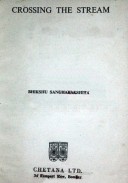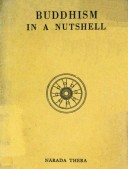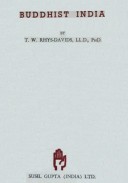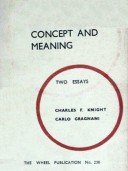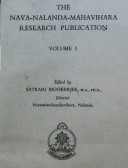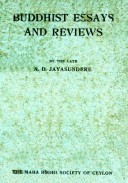Tìm Sách
Sách tiếng Anh-English >> Early Indian Religious Thought
Thông tin tra cứu
- Tên sách : Early Indian Religious Thought
- Tác giả : P. D. Mehta
- Dịch giả :
- Ngôn ngữ : Anh
- Số trang : 494
- Nhà xuất bản : Luzac & Co. Lt. LONDON
- Năm xuất bản : 1956
- Phân loại : Sách tiếng Anh-English
- MCB : 1210000004969
- OPAC :
- Tóm tắt :
PREFACE
Whilst the main bulk of the book deals with Early Indian Religious Thought, I have occasionally drawn upon other religious teachings, especially upon those in the Old and New Testaments.
In the presentation of the subject matter of the first part of this book, I have availed myself of the work done by a number of distinguished scholars, both non-Indian and Indian, in the field of Indian^ Religious Thought. Those points on which I am not in sympathy with the evaluations or judgments of some scholars, are included among the questions treated in the second part of the book. The reader will understand, therefore, why certain statements in this second part, or the implications of these statements, are either inconsistent with or directly contradict those in the first part.
Through long years spent in the West, I have had the good fortune to come to know the heart of Christian civilization. To know means to love and to respect. Only he who loves may enjoy the privilege of being outspoken. I have exercised this privilege in a few pages of this book.
My grateful thanks are due to Dr. William Stede for help in the translation of the Bhagavad-Gĩtã.VIII. 1-4; to Dr. and Mrs. R. W. Haines for critically reading the script of part two of the book, and for corrections and suggestions ; and to Mr. M. C. Pitts for remarks and suggestions in connection with pages 451 to 468.
I am most deeply indebted to Miss I. B. Honner. She read the entire script, and made valuable suggestions and corrections. She carefully revised all the translations of the Pali Texts quoted. She has given most generously of her time and her ripe scholarship. Her encouragement and help have been invaluable. It I would have been my sorrowful loss not to owe, and always to owe, so great a debt of gratitude to Miss Homer, one of the very true and quiet friends and servers of India and of the Buddhist world.
My thanks are also due to those who have taught me deep lessons in life. For eight and a half years I studied the piano under Solomon, whose kindness and generosity it is impossible to forget. From him I learned, as from no other, the meaning of self-dedication to an ideal of perfection. Our friendship since we first met in 1924 has been one of unclouded sunshine—a unique experience for me.
Dr. H. J. Fleure, F.R.S., is one of those rare personalities possessed of deep, critical and appreciative insight into the culture of other lands. I am happily in his debt. For twenty years I searched for my vocation in life. Then Dr. Fleure introduced me to it as easily as giving me a cup of tea.
I am deeply and thankfully indebted to all who brought me joy and sorrow and all that the round of life can hold for a man, without which it is not possible to realize and to fulfill.
P.D.M.
London, May 1953.
CONTENTS
Chapter I. Pre-Vedic Religious Thought
Earliest ideas and fertility cults
Proto-australoid beliefs
The “Mediterraneans” and the Indus Valley Culture
The Mother-Goddess figurine
The Siva seal amulet
Tree worship, phallic worship and animal worship
What was the religious sysfem of the Mediterraneans?
Chapter II. The Vedas
The Aryan entry
brahma “mana” and “linga”
The four Vedas, the Brahmahas, Aranyakas and upanishads
Demons and evil spirits
The celestial family
Varuna
Rta
Mitra
Indra
Agni
Brihaspati and Soma
Goddesses
The Supreme Being, Visvakarman and Hiranyagarbha
Immortality
Life after death
Transmigration
The Creation Hymn, Rig Veda X. 129
The Atharva Veda
The Brãhmanas
Karma and Rebirth
Chapter III. The Upanishads
Background of the Upanishads
Character of the Upanishads thinkers
Principal and minor Upanishads
Atman and Brahman
The Inner Controller
The Imperishable
Exposition of Yajnavalkya’s teaching
Meaning of the phrase, “knowing Brahman”
Meaning of the Silence
Ãtman and the “neti, neti” doctrine
Brahman in the Chãnđogya ưpanishad Nãrada and Sanatkumãra
Pratyagãtman and Paramãtman
The Upanishads and religion
Brahman and Ãtman in various Upanishads
Knowing Brahman
SELF-awareness and self-consciousness
Immortality
Yajnavalkya on immortality and love
Ethics
Man is made of everything
Desire
The greater austerity
Beyond good and evil
The liberated5 man
Monotheistic trends
Chapter IV. The Buddha and His Teachings
The probable early life of Siddhattha
Enlightenment, or realization of Truth
Nirvãnic consciousness
Interpretation of the struggle with Mãra
The Buddha’ạ scientific approach
The truth is for all
Denunciation of priests and priestly wisdom
The Buddha’s attitude to appreciators and deprecators
His manners
His opinion on pride of birth
His opinion on rituals and metaphysical speculations
The Ten Indeterminates
The story of the blind men and the elephant
A statement concerning the end of Ill
The Eight Deliverances
Some results of the practice of meditation
The Turĩya state
The four Jhanas
The Buddha’s assurance of Joy through living the good life
His “unborn, unoriginated, uncreated, unformed”
Correspondences with the teachings of Yoga
“Mindlessness”
Samãdi, and union of Paramãtman and Pratyagãtman
End of samsãra
Meaning of saihsãra and rebirth
Meaning of Mãra, Satan, the Prince of Darkness, The Evil One, The Lord of Death
Meaning of ” the serpent
The Buddha’s concern for Religion
His unconcern for respect to himself
Nature of the Buddha’s religion
The beginning of the Ministry and the First Sermon
Meaning of the meditations under the Goatherd’s banyan-tree, the Mucalinda tree and Rajayatana tree
The Buddha’s teaching is for all
Anattã and anicca
“Whatever is liable to uprising, all that is liable to stopping”
Sãriputta and Moggallãna
“There being this, that comes to be”
Karma
Faith and action
Hope
Ignorance and craving, the root causes of Ill
Jati (rebirth)
The Paịicca-samuppãda
Meaning of avijja and vijja
Critical point in Indian religious thought
Extinction of ignorance and craving
Minor details of mere morality
Meaning of, The Middle Way
Soul-theories and the analysis of man
Immortality
Difficulty of understanding jati
The Paricca-samuppada continued
The Buddha’s attitude to womankind
The dhammã
The Bhikkhu’s self-control, meditation and the Fourfold
Mindfulness
Love
The Brahma-vihãras
The Buddha
Chapter V. The Bhagavad-Gĩtã
Arj una’s despondency anố problem
The Divine Form
The Lord
God in the Gĩtã
Shri Krishna’s exhortation
“Thy business is with the action only, never with its fruits”
Yoga teachings
Action extolled
Desire is the source of sin
Krishna an Avatãra
How to be free, though performing action
Nature of the mind of a sage
Yoga and the Yogi
The righteous are never destroyed
What is Brahman?
Arjuna’s delusion taken away
The Gĩtã mainly a scripture of devotion
Characteristics of those dear to the Lord
Sãmkhyan views upheld
Brahman
The Gunas
Immortality
Purusha
Qualities distinguishing the good and the bad
The nature of renunciation
“My doubts have fled, I will do according to thy word”
PART TWO
Section a. Hinduism and the Buddha
Cultural background
Caste
Emergent religions and impacts
Hinduism
The Hindu order
Nature of the Way of Deliverance
Gotama’s way
States of consciousness
Essential elements of the Buddha’s enlightenment
The Eighth Deliverance
Meaning of welfare and well-being
The Noble Eightfold Path
Section B. The Word: MAVÃ: Reality
Divine authority claimed for all world-scriptures
The Word
Narrowness of bigot and zealot
Limitations of some scholars
Realizations by the Great Teachers, and expositions by their disciples
The Word
Reality
Waking, dreaming and deep sleep states
Samãdhi
Pure Consciousness as Reality
Atman said, “I am”
“What is one’s thought, that he becomes”
Mãyã
“This” world and “that” world
Several valid approaches to Reality
Section c. Reason : Buddhi: Interpretations of some Teachings
Reason and Buddhi
Contrast between realization or revelation and systematic knowledge
Symbols and meditation
Necessity for psychological and allegorical interpretations of eligious teachings
If We have drunk Soma and become immortal”
The Buddha looks at a “tree-root”
God “speaks”
Turning water into wine
The Immaculate Conception and the Virgin Birth
Section D. God-conception
The word “God”
What it means to the primitive, the developed and the liberated
Enoch
Significance of the discovery of the Giva seal of the Indus Valley civilization
Poet-seers of the Rig Veda
God-realization and God-conceptions
God-realization is only in terms of oneself
God-conceptions of the ancients
Purusha as Living God, Supreme Being
Kind of men who realized God
The Buddha’s “Him I call a brahman…”
A brahman is really one who has become Brahman
Paramãtman or Transcendent God
Doctrine of the Person in the Upanishads and Gĩtã
The gods
God made man in His own image
All gods are true gods
God as presented m the great religions
Culminating point in search of God
All terms of description of God partially misleading
God-realization is indescribable
Adam, Yima Kshaeta, and Yama
Meaning of the “first man”
Science and religion
Correspondences of Branman in Greek and Western Thought
Desire for God as a warm living Person, and the truth of God
Full understanding of Personal God needs understanding of Transcendent God an4*Brahman
Section E. Karma: Justice I Redemption
The world process is continuous action Karma
Natural law, human law and divine law
Obstacles to understanding karma
“One becomes good by good action, bad by bad action”
Is karma an ethical law or process?
The law wholly fulfils itself
The” ripening of the deed”
Expiation
The karmic process concretely illustrated in terms of human relations between A and B
The “fear of the Lord”
Repentance
Redemption
Justice
The end of karma
Section F. Sin: Good and Evil: Ethic And Transcendental Ethic
Forgiveness at various levels
Sin
Praying for forgiveness
Forgiving God
Forgiving the Great Teachers
The heart of ethical striving
Man’s goal
“Thy Will, not mine”
A moral problem
Eradicating evil
How one becomes the Virtuous One
Poverty and celibacy
Desirelessness and Transcendental Ethic
Order: Nirvana: Love
Religion
Inapplicability of worldly criteria for evaluating
RELIGION
Undesirability of militant evangelism
Crucifixion and resurrection
“God intervened, once and for all, to save mankind”, an unacceptable doctrine
India’s tolerance towards all religious thought
Salvation from rampant egoism
Closer unity between the religion not through syncretism or eclecticism
The religions and RELIGION
Forces for world disorder, and state of modem world
No panacea for world’s ills
Importance of individual, and of freedom
Guidance of religion sets problems
Welfare, and worldly and spiritual values
Prosperit
The optimum required, not maximum or minimum
War an outmoded technique of action today
Religion speaks directly to individuals, not to nations
Ethic of physical action must correspond to ethic of inner mental life
The individual’s responsibility for world order
World situations are the consequence of what we are ourselves and of what we think and do
The virtuous main is the true foundation of world order
Each man must make himself a worthy citizen of the City of God
The descent into hell before finding heaven
How man misses true happiness
Changing the level of consciousness
Whole acceptance
Indian religious thought shows the way to permanent happiness
Nature of true happiness
A practical experience of Nirvana
Nirvana, here-now, is man’s birthright and goal
The Personal God concept and man’s divine destiny
Love, the supreme value
Woman and man, and celibacy
Sex and marriage
The Immortal Beloved, and the Holy Family
In finality, Brahman is the Immortal Beloved
What chance is there of the supreme fulfilment?
The ground for faith and hope
 Facebook
Facebook
 Google
Google
 Google+
Google+


